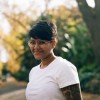Shastra Deo
after Bronwyn Lea’s ‘Bronwyn Lea’
I have no middle name. My mother did
not deign to pay homage to relatives
or ancestors, though I was given the bridge
between my aunt’s first and married names.
शास्त्रा—Shastra—may refer to a treatise,
to sacred scripture, yet it’s almost always
a suffix, equivalent to the English -ology:
meaningless unless attached to a subject
of perceived value. I have no Hindu gods to speak
of, no kinship with Dharmashastras, but
I know Apollo—his plague, poetry and prophecy,
Bragi and his cupful of promise. I can no longer
pronounce own my name. An inexperienced tongue
makes a trochee of me, where instead one should
hear two stressed feet: a spondee, second syllable
far from plosive, t pronounced with the tongue
at the tip of the teeth, like the thrall in thralldom.
In Old High German Deo means servant, yet
despite the fall of Rome we return to gods many
-minded and duplicitous, god as object: deo the dative
and ablative singular of deus—deity. देव is
perhaps a variant of the Sanskrit Deva: divine,
godlike, masculine. But Deo is a last name
of Demeter, so claimed by Orphic Hymn,
most likely derived from the Cretan δηά
—dea. I am not adept at harvest, not mistress
of a grain labyrinth: I have killed a lemon tree
and suppressed my own eggs. Still, Demeter
presides over sacred law: a goddess of divine
order, treatise and scripture unwritten.
Were my names reversed—Deoshastra—I
imagine it would be easier to speak
within my skin, recite the Devas with my paper-filled
mouth. Instead I am morpheme, foregoing
divinity: my name stripped of accents and spun
on a flat tongue, foreign gods clenched
in one small fist.
Genesis
I do not know how to translate
myself: text of twinned provenance,
fragment-
ary homeland. Foreign diviner of orphic
genesis.
I am colonisers’ reluctant philologist, roiling
patois, mouth curled muscular
over ouroboran viperslangs:
mother’s tongue split and blooming
apples on breath alone. My English
is a language of kenning, antigarden
of my speech, plot for
both Latin and Saxon
and what cuttings I take:
manus, hand, हाथ;
dens, tooth, दांत.
What music sidles—nostalgia of sound.
Many myths do not outlive their nativity,
but this—the snake, the tongue
against apple in hand, then hit by tooth
—eats through exile, enacts its
violence in utter-
rances settled, knowledge unsought, sins
neither committed nor remembered.
Find out more about Shastra Deo as part of QPF2017 here.

